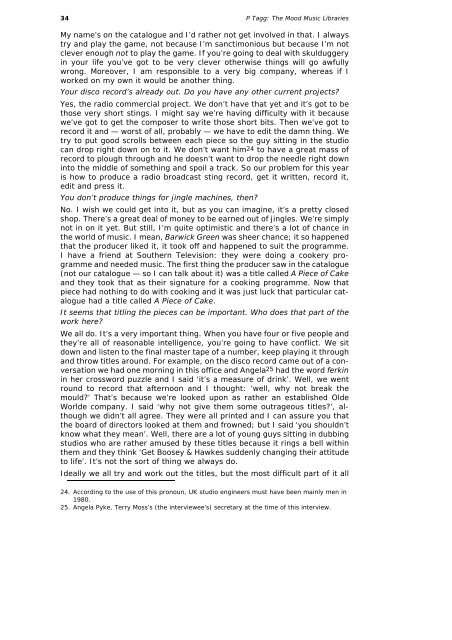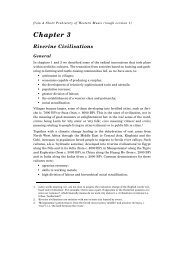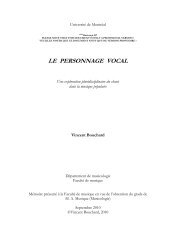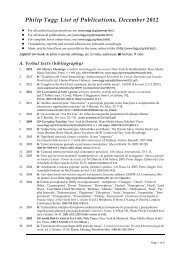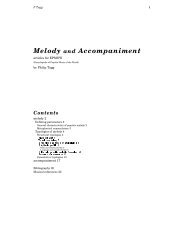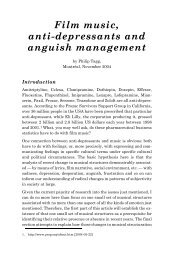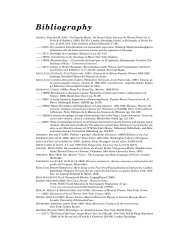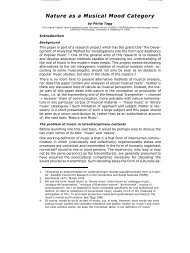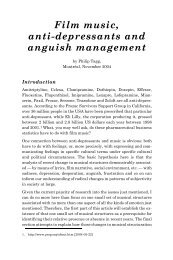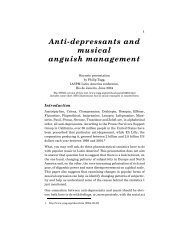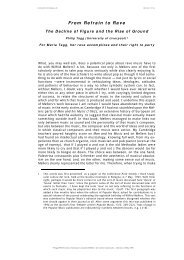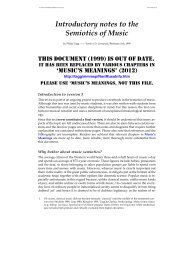interviews with library music producers - Philip Tagg
interviews with library music producers - Philip Tagg
interviews with library music producers - Philip Tagg
You also want an ePaper? Increase the reach of your titles
YUMPU automatically turns print PDFs into web optimized ePapers that Google loves.
34 P <strong>Tagg</strong>: The Mood Music Libraries<br />
My name’s on the catalogue and I’d rather not get involved in that. I always<br />
try and play the game, not because I’m sanctimonious but because I’m not<br />
clever enough not to play the game. If you’re going to deal <strong>with</strong> skulduggery<br />
in your life you’ve got to be very clever otherwise things will go awfully<br />
wrong. Moreover, I am responsible to a very big company, whereas if I<br />
worked on my own it would be another thing.<br />
Your disco record’s already out. Do you have any other current projects?<br />
Yes, the radio commercial project. We don’t have that yet and it’s got to be<br />
those very short stings. I might say we’re having difficulty <strong>with</strong> it because<br />
we’ve got to get the composer to write those short bits. Then we’ve got to<br />
record it and — worst of all, probably — we have to edit the damn thing. We<br />
try to put good scrolls between each piece so the guy sitting in the studio<br />
can drop right down on to it. We don’t want him24 to have a great mass of<br />
record to plough through and he doesn’t want to drop the needle right down<br />
into the middle of something and spoil a track. So our problem for this year<br />
is how to produce a radio broadcast sting record, get it written, record it,<br />
edit and press it.<br />
You don’t produce things for jingle machines, then?<br />
No. I wish we could get into it, but as you can imagine, it’s a pretty closed<br />
shop. There’s a great deal of money to be earned out of jingles. We’re simply<br />
not in on it yet. But still, I’m quite optimistic and there’s a lot of chance in<br />
the world of <strong>music</strong>. I mean, Barwick Green was sheer chance; it so happened<br />
that the producer liked it, it took off and happened to suit the programme.<br />
I have a friend at Southern Television: they were doing a cookery programme<br />
and needed <strong>music</strong>. The first thing the producer saw in the catalogue<br />
(not our catalogue — so I can talk about it) was a title called A Piece of Cake<br />
and they took that as their signature for a cooking programme. Now that<br />
piece had nothing to do <strong>with</strong> cooking and it was just luck that particular catalogue<br />
had a title called A Piece of Cake.<br />
It seems that titling the pieces can be important. Who does that part of the<br />
work here?<br />
We all do. It’s a very important thing. When you have four or five people and<br />
they’re all of reasonable intelligence, you’re going to have conflict. We sit<br />
down and listen to the final master tape of a number, keep playing it through<br />
and throw titles around. For example, on the disco record came out of a conversation<br />
we had one morning in this office and Angela 25 had the word ferkin<br />
in her crossword puzzle and I said ‘it’s a measure of drink’. Well, we went<br />
round to record that afternoon and I thought: ‘well, why not break the<br />
mould?’ That’s because we’re looked upon as rather an established Olde<br />
Worlde company. I said ‘why not give them some outrageous titles?’, although<br />
we didn’t all agree. They were all printed and I can assure you that<br />
the board of directors looked at them and frowned; but I said ‘you shouldn’t<br />
know what they mean’. Well, there are a lot of young guys sitting in dubbing<br />
studios who are rather amused by these titles because it rings a bell <strong>with</strong>in<br />
them and they think ‘Get Boosey & Hawkes suddenly changing their attitude<br />
to life’. It’s not the sort of thing we always do.<br />
Ideally we all try and work out the titles, but the most difficult part of it all<br />
24. According to the use of this pronoun, UK studio engineers must have been mainly men in<br />
1980.<br />
25. Angela Pyke, Terry Moss’s (the interviewee’s) secretary at the time of this interview.


